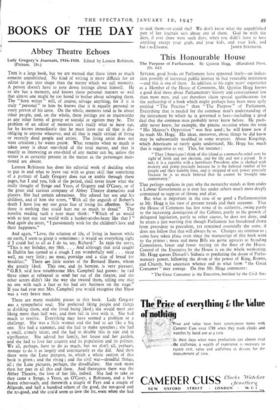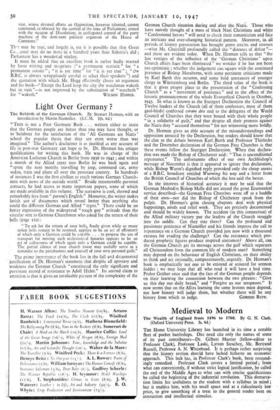This Honourable House
SEVERAL good books on Parliament have appeared lately—an indica- tion possibly of increased public interest in that venerable institution —and this is one of them. In addition to his eight years' experience as a Member of the House of Commons, Mr. Quintin Hogg knows a good deal more about Parliamentary history and constitutional law than most men, and can therefore claim special qualifications for the authorship of a book which might perhaps have been more aptly entitled " The Practice " than " The Purpose" of Parliament. Everything that is needed for the common man's understanding of the instrument by which he is governed is here—including a good deal that the common man probably never knew before. He prob- ably never knew, for example, the precise occasion when the term " His Majesty's Opposition " was first used ; he will know now if he reads Mr. Hogg. His ideas, moreover, about things he did know may be substantially modified in some respects. About Kingship, which Americans so rarely quite understand, Mr. Hogg has much that is suggestive to say. This, for instance: " They [Americans] think of this island as a monarchy ruled over by right'of birth and not election, and for life and not a period. It is not; it is a republic with a hereditary President, who is clothed with majesty and pomp precisely because he is the beloved symbol of his people and their humble lives, and is stripped of real power precisely because he is so much beloved that he cannot be brought into controversy."
That perhaps explains in part why the monarchy stands as firm under a Labour Government as it ever has under others much more deeply committed to support of throne and altar.
But what is important in the case of so good a Parliamentarian as Mr. Hogg is his view of present trends and their outcome. That the House of Commons has lost some of its authority, owing partly to the increasing domination of the Cabinet, partly to the growth of delegated legislation, partly to other causes, he does not deny, and he utters a just warning that though Parliament has broadened down from precedent to precedent, yet remained essentially the same, it does not follow that that will always be so. Changes are continuous ; some have taken place even since the manuscript of this book went to the printer ; more and more Bills are going upstairs to Standing Committees, fewer and fewer staying on the floor of the House. Control of the Executive by the House is on the whole weakening. Mr. Hogg quotes Disraeli's Sidonia as predicting the doom of Parlia- mentary power, following the doom of the power of King, Bandits, • and Church, but uncertain whence and in what form "the Great Consumer " may emerge. On that Mr. Hogg comments: " The Great Consumer is the Executive, fortified by the Civil Ser-
vice, whose devoted efforts an Opposition, however talented, cannot command; reinforced by the control of the time of Parliament; armed with the weapon of Dissolution; in undisputed control of the party machine of the dominant political organism of the House of Commons." _ Th"t may be true, and largely, is, yet it is possible that that Great Coi.....umer may do no more in a hundred years than Sidonia's did ; Parliament has a wonderful vitality.
It must be added that an excellent book is rather badly marred by loose writing and misprints (" a permanent statistic " for " a permanent statute " ; " it is yet time " for " it is yet true " ; " the B.B.C. is always scrupulously careful to select their speakers ") and the quotation with which Mr. Hogg effectively closes an argument and his book—" Except the Lord keep the city the watchman waketh but in vain "—is not improved by the substitution of " watcheth "



































 Previous page
Previous page